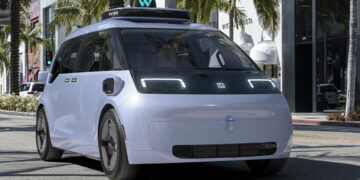There are several reasons why electric vehicles (EVs) are currently more expensive compared to conventional internal combustion engine (ICE) vehicles. We recently conducted a research campaign into the difference between what drivers expect to pay for a car and the prices that they are being offered. Apart from the Tesla Model Y, the top 10 best selling vehicles in 2022 in the UK all used some form of petrol-powered internal combustion engine (ICE). Multiplying the number of units sold by the price of each model, we calculated the average price of a new car in 2022 to be close to £23,000. We also surveyed the average price of the EVs being offered and landed on a figure much closer to £46,000. In this article, we look at why there is this disparity and ask how long it will last.
There is a small gap between the reasons given by the industry and the information previously presented by car company CEOs when asked about producing EVs. In 2019, the CEO of VW said that he expected EVs to have up to 40% fewer parts. Without taking anything else into consideration, we might expect EVs to cost less than an ICE.
Traditional car makers have launched wave after wave of cars that cost double the average purchase price of a top 10 best seller – and they are now meeting softer levels of demand. At the same time, the second hand market is starting to boom off the back of record sales in 2020 and 2021 – half of which were likely to have been bought with some kind of leasing scheme in place.
Industry leaders have pinpointed soaring prices as a primary cause for the plummeting demand for electric cars this year. This trend has prompted several automakers to reassess their EV initiatives. Ford, for instance, has postponed a £10 billion investment in its EV programmes, and General Motors has abandoned plans to manufacture 500,000 EVs by the first half of 2024.
Here are three primary reasons why prices are so high (relatively) for EVs today:
Battery Costs
The cost of manufacturing batteries, which are a crucial component of EVs, is one of the major factors contributing to their higher price. Battery technology represents a significant portion of an EV's overall cost, and although prices have been declining steadily over the years, they still remain relatively high.
Economies of Scale
The production volume of EVs is considerably lower than that of traditional ICE vehicles. Mass production drives down costs through economies of scale, but as the demand for EVs continues to grow and manufacturing processes become more efficient, the economies of scale for EVs are expected to improve, leading to cost reductions.
Limited Infrastructure and high R&D Costs
The infrastructure required to support EVs, such as charging stations, is still developing and requires substantial investments. Additionally, research and development costs for new EV technologies and advancements in efficiency contribute to the higher upfront prices of these vehicles.
Nevertheless, a beacon of change may be on the horizon. EV sales continue to experience an upsurge in many markets around the globe – with the US likely to pass the ‘1 million units sold' mark this year – picking up a 9% share of the passenger car market.
The UK is also doing well, with over half the vehicles sold in October having some kind of electric motor for propulsion. China and Germany have witnessed EVs capturing 33% and 35% of sales respectively in the first part of 2023 – according to Bloomberg.
One of the big drivers in this area, is likely to come from Tesla – with the much anticipated introduction of a £25,000 electric car as early as next year.
Looking at the main reasons why the price of EVs might significantly fall by 2030, we find:-
Technological Advancements
Continued advancements in battery technology and manufacturing processes are expected to significantly reduce the cost of producing EV batteries. Innovations such as solid-state batteries, increased energy density, and improved production methods could lead to substantial cost reductions. Recent reports suggest that the price per kWh for EV batteries has dropped by almost 90% since the introduction of the earliest EVs like the first Nissan Leaf. Local supply/production in the UK will see battery prices fall more.
Increased Production and Demand
As the demand for EVs grows and production expands, economies of scale will kick in, leading to cost efficiencies in manufacturing. This increased production volume will likely drive down costs for components, assembly, and overall vehicle production.
Government Support and Incentives
Many governments worldwide are providing incentives and subsidies to encourage the adoption of EVs. Continued support, such as tax incentives, rebates, and funding for infrastructure development, could help reduce the overall cost of EV ownership, making them more affordable for consumers.
Combining these factors—technological advancements, increased production scale, and ongoing government support—suggests a plausible scenario where the price of EVs could significantly decrease by 2030, making them more competitive with traditional ICE vehicles.
It will be worth watching out of the launch of a £25,000 Tesla, because such a move will force all other manufacturers to rethink their price stack.



















Discussion about this post